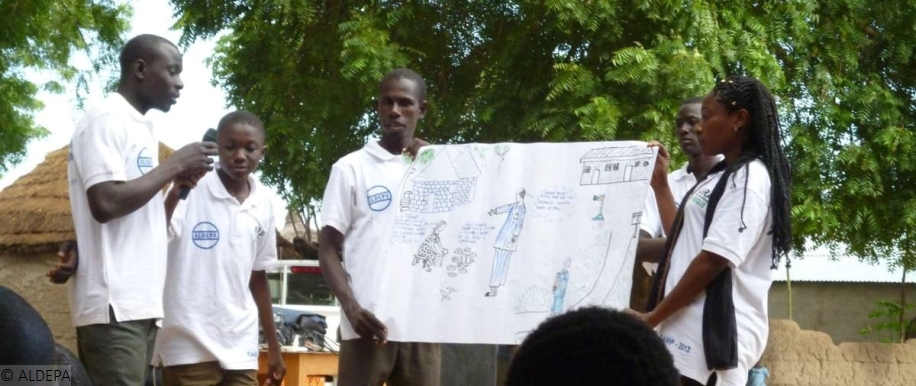Translation of children’s rights into local languages and cultural contexts
With our african partners in Togo, Mali, Benin and Cameroon, we are translating important children’s rights into local languages and cultural contexts in order to render these norms more accessible to rural pupulations in our project areas.
A practical guide with children’s rights in simple frnech and 7 local languages from Togo can now be downloaded here.
Inculturation DDE complet.pdf
PDF-Dokument [3.2 MB]
Context
All children around the world have inalienable, fundamental rights. In order to implement children’s rights comprehensively and sustainably, everybody needs to
contribute: parents, the social community and children themselves. However, the essential elements of the United Nation’s Convention on the Rights of the Child as
well as the African Charter on the Rights and Welfare of the Child are little known and even less understood in rural areas of our partner countries. Hence,
information on children's rights has to be spread in local languages during awareness-raising and education campaigns.
Yet, in many African languages, there is no equivalent for the rights of children. An often used translation is the power of children, which causes confusion and rejection throughout the population in all of our project regions and opposes child rights activism. It is thus necessary to translate these texts into local languages using colloquial expressions, traditional sayings and examples from every-day life.
Project Objectives
Children are better protected as their social community knows about their rights as well as about the responsibilities of adults, parents in particular and children. A
guide with a culturally adapted and commented translation of important rights and duties is being developed by local linguists, child rights experts and community
groups.
Target Groups
The commented guides will be used by:
- Civil society organisations
- Traditional and religious authorities
- Media representatives
- instructors, group leaders and other facilitators
to reach:
- Local social communities, particularly parents and their children
Approach
In Mali, Togo, Benin and Cameroon, children's rights are being translated and explained in a culturally adapted way by liguists and our partner organisations. These
definitions and their explanations are being tested in practice before the edition of a commented guide in the most common languages of our project regions. In these tests local networks,
associations and groups of adults and children contribute to finding understandable and acceptable definitions. The publications are then being distributed amoung child rights activists, media and
other key agents who are active in awareness-raising. In Togo, a first guide was completed in 2016. You can download it here:
Funding
The activity is included in our running projects with our partners.
Cover picture: Many information campagns are held in local languages. This needs culturally appropriate translations. © ALDEPA





